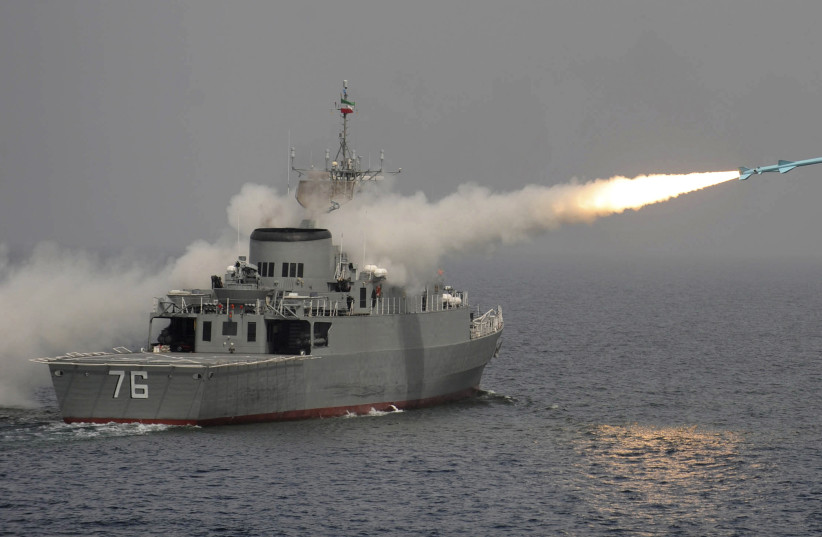Iran trying to assert dominance by threatening US warships in Gulf – analysis
Iran threatened US warships in the Persian Gulf in a video it released this week.
The Iranian fast boats conducted various maneuvers at sea as they have in the past to show that Iran is not deterred by the US who always has warships based in the Gulf and often on patrol in the region, including usually an aircraft carrier, destroyers, and other vessels. The US has also recently increased its public movement of warplanes and ships to the region saying the goal is to deter Iran via these additions to US Central Command.
Iran’s new video, which actually took place on August 17, shows that their naval fast boats approached a US warship and communicated with it. The Iranians identified themselves as “Sepah Navy Station” and claimed that US helicopters were entering Iranian territorial waters. They said the US should move any helicopters that were airborne back to the US naval ships and that if the US did not then Iran would open fire.
The videos of the incident were then edited to make it appear as though the US helicopters had returned to the US ships.
The Iranians claim that this shows their “presence” in the Gulf. Iran appeared to use a drone to conduct surveillance of the incident and the footage appears to show helicopters on the deck of the US ship. While Iran claims that it intercepted the USS Bataan and USS Thomas Hudner ships, it is unclear if the incident happened the way Iran claims it unfolded. A report by Fox News said that the Pentagon provided a statement claiming that the Iranian reports were not true.
 A Nour missile is test fired off Iran’s first domestically made destroyer, Jamaran, on the southern shores of Iran in the Persian Gulf March 9, 2010 (credit: REUTERS/EBRAHIM NOROOZI/IIPA)
A Nour missile is test fired off Iran’s first domestically made destroyer, Jamaran, on the southern shores of Iran in the Persian Gulf March 9, 2010 (credit: REUTERS/EBRAHIM NOROOZI/IIPA)The US works to deter Iran’s actions according to US Air Forces Central Command, and the US Naval component of Central Command has said that the US is committed to the freedom of commerce and navigation in a safe and secure maritime environment in the region.
The USS Bataan is defined as an amphibious assault ship that is similar to an aircraft carrier but plays a different role. The ship leads the Bataan Amphibious Ready Group which left Virginia in July and sailed to the Gulf. It has over 4,000 personnel on several ships. According to USNI news, it is carrying parts of the 26th Marine Expeditionary Unit and has a Helicopter Sea Combat Squadron as well as other forces. It can reach speeds of 22 knots (41 km/hr) and can carry Super Cobra helicopters, the MV-22B Osprey assault tiltrotor copters, as well as Super Stallion heavy lifters.
“So they could be floating it out there to see how the Iranians respond, and with having this large group in the Persian Gulf – even if they aren’t yet on freighters – do you see a decline in attempted interdictions by Iranian naval forces? Does just the signaling work having them in the area,” Dakota L. Wood, a senior research fellow at The Heritage Foundation and a retired Marine Corps lieutenant colonel told USNI.
Is the footage genuine?
Joseph Trevithick at The Drive noted that the videos released by Iran also show the Iranian ship the Shahid Mahdavi and other elements of the IRGC navy. The IRGC has its own navy which is in some ways more of a threat than the actual Iranian navy, which is quite small. Iran has tried to boost its naval capabilities recently and sent ships on long-range missions. Iran also has new drones and missiles for its naval vessels and IRGC fast boats.
According to the Drive article, the US “Navy’s Wasp class amphibious assault ship USS Bataan and Arleigh Burke class destroyer USS Thomas Hudner are visible in the Iranian pictures and videos.” The article notes that the Iranian footage “shows at least one AH-1Z, UH-1Y, and MH-60 were airborne for a time during the transit. This is typical of US force protection measures for ships moving through the Strait of Hormuz, which also includes personnel up on the decks making use of various weapon systems, including Stinger shoulder-fired surface-to-air missiles, also known as man-portable air defense systems (MANPADS).”
The incident shows how Iran wants to counter US claims that the US is deterring Iran. Iran wants to show the US is deterred and assert that the US ships and helicopters obey Iranian warnings. The videos are edited in such a way that it does not appear the US actually did comply with Iran’s demands. In any case, it’s possible for an Iranian fast boat to pull up to an area near the maritime border and claim to make a radio call and show radio contact, when the US doesn’t change course and simply claim the US changed course or landed helicopters. Helicopters have to land at some point, so all Iran has to do is wait for one to land and claim it complied with Iran’s radio message, even if the two events are unconnected.





Comments are closed.